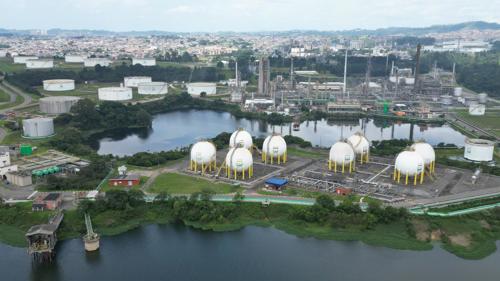Petrobras and Braskem complete tests for renewable content chemical product
Petrobras has successfully finished a series of industrial-scale tests to produce a light hydrocarbon stream (LHR) rich in ethylene, incorporating renewable content. Over the past year, this project, in collaboration with Braskem, has developed a viable renewable raw material for the chemical industry.
The tests used ethanol derived from sugarcane, co-processed at the residue fluid catalytic cracking unit (RFCCU) at Recap. This process produced LHR with renewable content, reducing carbon intensity compared to traditional 100% mineral products.
The positive results were achieved at the Capuava Refinery (Recap) in Mauá, São Paulo. The agreement between the two companies aims to find technological solutions to enhance the sustainability of their portfolios, with a focus on circular economy and renewable raw materials.

Capuava Refinery, in Mauá (SP), where the tests took place.
The successful production of LHR with renewable content creates new business opportunities and strengthens Petrobras' role in seeking sustainable solutions. The company is preparing its refineries to meet the increasing demand for low-carbon fuels and chemical products, aligning with market expectations and supporting a greener future.
This initiative is part of Petrobras' BioRefining Program, which seeks to develop more sustainable and efficient fuels and products with reduced greenhouse gas (GHG) emissions. William França, Petrobras' Director of Industrial Processes and Products, explains that this test aligns with the company's vision of adapting its refining operations to a low-carbon economy. "Petrobras is preparing its refineries to play a key role in the energy transition, investing in energy efficiency and reducing the carbon footprint of its operations and products," he notes.
The tests have confirmed the operational feasibility of producing LHR with renewable content.
The technology, developed by Petrobras' Research, Development, and Innovation Center (Cenpes), demonstrated that co-processing ethanol on an industrial scale at the RFCCU is technically feasible without affecting other refinery outputs.
The test product was sent to Braskem, where the hydrocarbon with renewable content was successfully processed at the Santo André industrial unit. These efforts comply with the Research, Development, and Innovation regulations of the National Petroleum, Natural Gas, and Biofuels Agency (ANP).
Claudio Schlosser, Petrobras' Director of Logistics, Marketing and Markets, states, "This initiative is aligned with our goal to build a more sustainable product portfolio, expanding our commercial activities into the energy transition sector."
Renata Baruzzi, Petrobras' Director of Engineering, Technology and Innovation, adds, "The studies at Cenpes are crucial for creating the future refineries. We aim for an industrial park capable of processing both petroleum and renewable materials like vegetable oil or ethanol to produce either fossil or renewable fuels."
Antonio Queiroz, Braskem's Vice President of Innovation, Technology and Sustainable Development, comments that the partnership with Petrobras is a significant step in their commitment to a carbon-neutral circular economy: "The pursuit of raw materials from renewable sources is essential for building a more sustainable future and has been a key objective for Braskem."
Related News
- Applied Computing and KBR to launch AI-based solution for optimized ammonia production
- Technip Energies awarded two large contracts by BPCL for new units at Bina and Mumbai refineries in India
- ADNOC and TAQA announce 27-yr utilities agreement with TA’ZIZ, enabling world-scale chemicals production at Ruwais






Comments